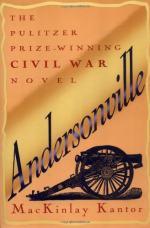Next, I wanted to go out to see if there was any prospect of escape. I had long since given up hopes of escaping from the Stockade. All our attempts at tunneling had resulted in dead failures, and now, to make us wholly despair of success in that direction, another Stockade was built clear around the prison, at a distance of one hundred and twenty feet from the first palisades. It was manifest that though we might succeed in tunneling past one Stockade, we could not go beyond the second one.
I had the scurvy rather badly, and being naturally slight in frame, I presented a very sick appearance to the physicians, and was passed out to the Hospital.
While this was a wretched affair, it was still a vast improvement on the Stockade. About five acres of ground, a little southeast of the Stockade, and bordering on a creek, were enclosed by a board fence, around which the guard walked, trees shaded the ground tolerably well. There were tents and flies to shelter part of the sick, and in these were beds made of pine leaves. There were regular streets and alleys running through the grounds, and as the management was in the hands of our own men, the place was kept reasonably clean and orderly for Andersonville.
There was also some improvement in the food. Rice in some degree replaced the nauseous and innutritious corn bread, and if served in sufficient quantities, would doubtless have promoted the recovery of many men dying from dysenteric diseases. We also received small quantities of “okra,” a plant peculiar to the South, whose pods contained a mucilaginous matter that made a soup very grateful to those suffering from scurvy.
But all these ameliorations of condition were too slight to even arrest the progress of the disease of the thousands of dying men brought out from the Stockade. These still wore the same lice-infested garments as in prison; no baths or even ordinary applications of soap and water cleaned their dirt-grimed skins, to give their pores an opportunity to assist in restoring them to health; even their long, lank and matted hair, swarming with vermin, was not trimmed. The most ordinary and obvious measures for their comfort and care were neglected. If a man recovered he did it almost in spite of fate. The medicines given were scanty and crude. The principal remedial agent—as far as my observation extended—was a rank, fetid species of unrectified spirits, which, I was told, was made from sorgum seed. It had a light-green tinge, and was about as inviting to the taste as spirits of turpentine. It was given to the sick in small quantities mixed with water. I had had some experience with Kentucky “apple-jack,” which, it was popularly believed among the boys, would dissolve a piece of the fattest pork thrown into it, but that seemed balmy and oily alongside of this. After tasting some, I ceased to wonder at the atrocities of Wirz and his associates. Nothing would seem too bad to a man who made that his habitual tipple.




